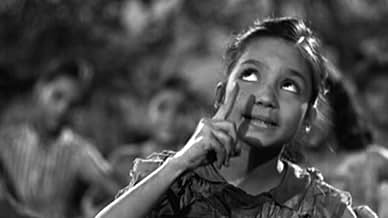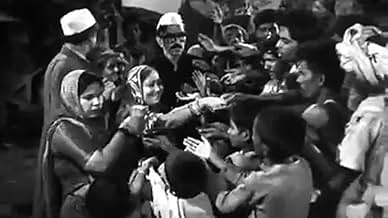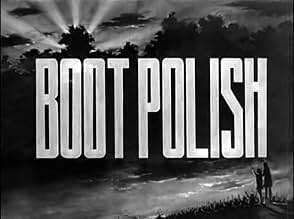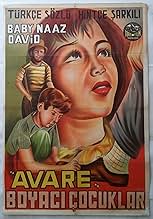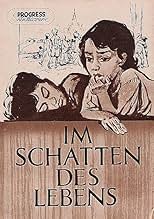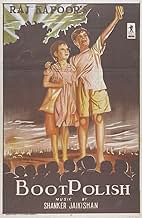CALIFICACIÓN DE IMDb
7.9/10
916
TU CALIFICACIÓN
Agrega una trama en tu idiomaPre-teen brother and sister, abandoned by their father to be taken care of by an abusive prostitute aunt, survive life in an Indian squatters' camp, aided by a friendly cripple, by learning ... Leer todoPre-teen brother and sister, abandoned by their father to be taken care of by an abusive prostitute aunt, survive life in an Indian squatters' camp, aided by a friendly cripple, by learning to shine shoes instead of begging.Pre-teen brother and sister, abandoned by their father to be taken care of by an abusive prostitute aunt, survive life in an Indian squatters' camp, aided by a friendly cripple, by learning to shine shoes instead of begging.
- Premios
- 4 premios ganados y 1 nominación en total
Kumari Naaz
- Belu
- (as Baby Naaz)
Ratan Kumar
- Bhola
- (as Rattan Kumar)
David Abraham
- John
- (as David)
Chand Burke
- Kamla Devi
- (as Chand Burque)
Bhudo Advani
- Pedro
- (as Budho Advani)
Raj Kapoor
- Man asleep on train
- (sin créditos)
Opiniones destacadas
This is the sort of film which shows both the strengths - and the weaknesses - of classic Bollywood cinema. Conceived and executed more often than not with the mass audience in mind, but hoping to make some serious statements behind all the light entertainment, 'Boot Polish' suffers from being a little too long, as well as possessing an over- simplistic ending. On the plus side there is some great acting by the two young leads and some excellent social comment to be gleaned, conveyed through the fine black and white cinematography. Raj Kapoor, who makes a cameo appearance in the film, apparently saw the first cut of the project, then promptly scrapped a lot of what had been produced to start over again. His presence is perhaps most felt in some the Chaplinesque scenes and reforming sentiments which which surround Belu and John's kindly uncle (Prabhu Arora). The inherent decency of people, and the cinematic pathos of children torn from their guardians are all familiar from some of Chaplin's films.
As some critics have noted the two children, with Uncle's then John's particular insistence on the dignity of labour and disavowal of begging as a way of life, can be seen as symbolising the ambitions and hopes of Young India - which interpretation explains the somewhat naive ending of the film. Despite the distress which overtakes some of the young participants, Boot Polish ends on a note of optimism for the future, presumably echoing the Congress Party's offical line at the time. Before the two reach their just deserts however, and during their struggles to make ends meet and make their boot cleaning business work, there is a more obvious cinematic influence: that of the Italian Neo-Realists, especially Vittorio De Sica, whose own 'Shoe Shine'/'Sciuscià' had appeared in 1946.
While one or two of the songs interspersed through the film might be willingly dispensed with by modern Western audiences, there's one comic number (sung by Uncle in prison with a cell full of bald men) which is priceless and shouldn't be missed. Uncle is a convincing proseyltizer for the national Way Ahead, while a minor disreputable scoundrel in his own right. Less convincingly drawn are the parents who adopt Belu. Their all-round charitable concern reminds one of the childless couple who take Oliver Twist in off the streets, which is a form of symbolic caring rather than one dramatically fulfilling for the reader/viewer.
A word should be said about the excellent performance by Baby Naaz as the young sister Belu, in this her first appearance on screen. Although she only made a handful of films, her talent is amazing (as self aware and as talented as the young Jodie Foster IMHO) and is one of the biggest reasons to see the film.
Taken as a whole, 'Boot Polish' is very entertaining as well as being typical of the time at which it was made. If you enjoy classic Bollywood at close to its best, then this will worth looking out for. Admirers of the great Raj Kapoor will need little persuasion, but those who wish to see a great comic turn by Arora (is this really his only film?) will be advised too.
As some critics have noted the two children, with Uncle's then John's particular insistence on the dignity of labour and disavowal of begging as a way of life, can be seen as symbolising the ambitions and hopes of Young India - which interpretation explains the somewhat naive ending of the film. Despite the distress which overtakes some of the young participants, Boot Polish ends on a note of optimism for the future, presumably echoing the Congress Party's offical line at the time. Before the two reach their just deserts however, and during their struggles to make ends meet and make their boot cleaning business work, there is a more obvious cinematic influence: that of the Italian Neo-Realists, especially Vittorio De Sica, whose own 'Shoe Shine'/'Sciuscià' had appeared in 1946.
While one or two of the songs interspersed through the film might be willingly dispensed with by modern Western audiences, there's one comic number (sung by Uncle in prison with a cell full of bald men) which is priceless and shouldn't be missed. Uncle is a convincing proseyltizer for the national Way Ahead, while a minor disreputable scoundrel in his own right. Less convincingly drawn are the parents who adopt Belu. Their all-round charitable concern reminds one of the childless couple who take Oliver Twist in off the streets, which is a form of symbolic caring rather than one dramatically fulfilling for the reader/viewer.
A word should be said about the excellent performance by Baby Naaz as the young sister Belu, in this her first appearance on screen. Although she only made a handful of films, her talent is amazing (as self aware and as talented as the young Jodie Foster IMHO) and is one of the biggest reasons to see the film.
Taken as a whole, 'Boot Polish' is very entertaining as well as being typical of the time at which it was made. If you enjoy classic Bollywood at close to its best, then this will worth looking out for. Admirers of the great Raj Kapoor will need little persuasion, but those who wish to see a great comic turn by Arora (is this really his only film?) will be advised too.
Boot polish is a masterpiece in Indian cinema.The movie is well scripted with powerful performances by baby Naaz and Ratan Kumar.Baby Naaz steals your heart through her fantastic performance and also through her dialogue delivery. Boot polish is a masterpiece because the theme of the movie is relevant even today.The writing is exceptional which makes this movie a masterpiece.Even the songs are exceptionally wonderful.boot polish will remain as a masterpiece in Indian cinema for the unique performance of baby Naaz.The dialogues are heart touching.David Abraham gives a memorable performance as uncle john.Shankar Jaikishan music is excellent with fantastic songs.A masterpiece that requires high Honour forever in the Indian cinema.A masterpiece with an fine social melodrama.A must see for every Indian.
I must admit I've always enjoyed the films of Raj Kapoor especially from his early golden period, but can find his moralising laid on a little heavy at times. He took the best pathos and melodrama from Chaplin and spun it out relentlessly. As in Boot Polish. It's not that I can argue with any of his philosophising and moral instruction, just that history has proved Film itself will never change the social system; it never brings shame to the faces of our Betters, but it probably would just make them wonder how much more they can turn the screws on us. After all, Film represents an entertainment they have paid their paisa or pennies for us to waste production time watching.
Two young children are orphaned and thrown onto the not so tender mercies of their scolding prostitute aunt and nice but drunken uncle in a Mumbai slum. She teaches them to beg for a living, he tries to teach them of the better, honest and more painful way, in their case the complicated profession of polishing other people's boots. It's done very well, and if it wasn't for the comedy and the songs almost neo-realist - RK even makes a fag-in-cheek cameo at the beginning. To beg or not to beg, that is the question - but the pain of surviving the slings and arrows of capitalism goes on and on for the children, although their destitute situation does eventually improve. Baby Naaz must have been very young but she provided a marvellously believable performance. My favourite bit though amidst all the grinding poverty is the energetic comic raag Lapak Jhapak To Aare Badarwa sung by Manna Dey for the uncle and his fellow bald headed companions in jail – delicious stuff! I always wondered whether bits like these were particularly edited out in the Russian versions?
Needless to say self-sacrifice and self-effacement bring their reward - so basically it's another rewarding film from RK, an expertly produced moral melodrama.
Two young children are orphaned and thrown onto the not so tender mercies of their scolding prostitute aunt and nice but drunken uncle in a Mumbai slum. She teaches them to beg for a living, he tries to teach them of the better, honest and more painful way, in their case the complicated profession of polishing other people's boots. It's done very well, and if it wasn't for the comedy and the songs almost neo-realist - RK even makes a fag-in-cheek cameo at the beginning. To beg or not to beg, that is the question - but the pain of surviving the slings and arrows of capitalism goes on and on for the children, although their destitute situation does eventually improve. Baby Naaz must have been very young but she provided a marvellously believable performance. My favourite bit though amidst all the grinding poverty is the energetic comic raag Lapak Jhapak To Aare Badarwa sung by Manna Dey for the uncle and his fellow bald headed companions in jail – delicious stuff! I always wondered whether bits like these were particularly edited out in the Russian versions?
Needless to say self-sacrifice and self-effacement bring their reward - so basically it's another rewarding film from RK, an expertly produced moral melodrama.
"There is no difficulty such that you cannot overcome it and no height such that you cannot reach it; you must keep trying." Raj Kapoor...
I saw Boot Polish once when I was a student in Michigan many years ago and I never forgot it. I was thrilled to be able to see it again this week in its new DVD release by Yash Raj Films, and I loved it just as much if not more.
Boot Polish is a pure example of Hindi cinema (now called "Bollywood"). It is filled with songs and dances, stylized artifice, idealized characters, myriad sub-plots, and an inspiring message. Though not a musical, the joyous and hypnotic songs are interwoven into the plot in a way that both enhances the drama and reminds you that it is "also" a movie.
The direction is attributed to Prakash Arora, assistant to the "great showman" Raj Kapoor; however, the story is that Kapoor took one look at the rush print and realized he had made a mistake in assigning it to Arora, then re-shot the entire film himself. The film won the 1953/54 Filmfare awards (India's version of the Oscars) for best picture, best supporting actor, and best cinematography.
The story is about the relationship between a ten-year old boy, Bhola (Rhatan Kumar) and his seven-year old sister Belu (Baby Naaz). The children are without parents. They live in a slum area in Bombay with Kamla, a cold and unloving relative, and must beg to stay alive. Bhola and Belu undergo verbal and physical abuse from Kamla when they don't bring home enough money each day. Their only friend is a neighbor, John Chacha (David Ebrahim), who operates a bootlegging business outside the law.
John Chacha provides the kids with the emotional warmth they need and tells them not to beg but to find some work. "Starve, die, but don't beg. Do something with your two hands", he says and instructs them in the art of polishing shoes. Bhola and Belu gradually become proficient in their trade and eke out a living, refusing to take alms. The monsoon rains come, however, and their business suffers. In addition, John's arrest takes from them the little love and comfort they had. Beg or die is the question that the children must now face.
Some may dismiss Boot Polish as melodrama but, for me, it is a life affirming and immensely rich cinematic experience. The love of the children for each other is very real, and their struggle for survival and social respectability is deeply moving. Filled with positive energy and the "heroic face of innocence", Boot Polish is now more than ever one of my all time favorite films.
I saw Boot Polish once when I was a student in Michigan many years ago and I never forgot it. I was thrilled to be able to see it again this week in its new DVD release by Yash Raj Films, and I loved it just as much if not more.
Boot Polish is a pure example of Hindi cinema (now called "Bollywood"). It is filled with songs and dances, stylized artifice, idealized characters, myriad sub-plots, and an inspiring message. Though not a musical, the joyous and hypnotic songs are interwoven into the plot in a way that both enhances the drama and reminds you that it is "also" a movie.
The direction is attributed to Prakash Arora, assistant to the "great showman" Raj Kapoor; however, the story is that Kapoor took one look at the rush print and realized he had made a mistake in assigning it to Arora, then re-shot the entire film himself. The film won the 1953/54 Filmfare awards (India's version of the Oscars) for best picture, best supporting actor, and best cinematography.
The story is about the relationship between a ten-year old boy, Bhola (Rhatan Kumar) and his seven-year old sister Belu (Baby Naaz). The children are without parents. They live in a slum area in Bombay with Kamla, a cold and unloving relative, and must beg to stay alive. Bhola and Belu undergo verbal and physical abuse from Kamla when they don't bring home enough money each day. Their only friend is a neighbor, John Chacha (David Ebrahim), who operates a bootlegging business outside the law.
John Chacha provides the kids with the emotional warmth they need and tells them not to beg but to find some work. "Starve, die, but don't beg. Do something with your two hands", he says and instructs them in the art of polishing shoes. Bhola and Belu gradually become proficient in their trade and eke out a living, refusing to take alms. The monsoon rains come, however, and their business suffers. In addition, John's arrest takes from them the little love and comfort they had. Beg or die is the question that the children must now face.
Some may dismiss Boot Polish as melodrama but, for me, it is a life affirming and immensely rich cinematic experience. The love of the children for each other is very real, and their struggle for survival and social respectability is deeply moving. Filled with positive energy and the "heroic face of innocence", Boot Polish is now more than ever one of my all time favorite films.
What worked:
- the sublime message of the movie advocates for hard work, hope and perseverance. Relevant to it's time, the movie takes into consideration the child psychology, and narrates the raw, gritty and sad truth of its time. I think it is okay to say that the many movies of that generation talks about The socioeconomic disparity between the haves and havenots.
- culturally irrelevant; though the movie has its strong influence of that time, it's irrelevant and not relatable. Of course, there is poverty, discrimination and sadistic reality in today's society, maybe today's filmmaker will definitely use this movie's main agenda as a sublayer of a main plot instead of keeping it the main agenda.
¿Sabías que…?
- TriviaThis movie is a remake of Italian movie "Shoeshine". But Raj Kapoor shaab made it in Indian style.
- ConexionesRemade as Morad o Laleh (1966)
- Bandas sonorasRaat Gayi
Music by Shankarsingh Raghuwanshi & Jaikishan Dayabhai Panchal
Selecciones populares
Inicia sesión para calificar y agrega a la lista de videos para obtener recomendaciones personalizadas
- How long is Boot Polish?Con tecnología de Alexa
Detalles
- Tiempo de ejecución
- 2h 29min(149 min)
- Color
- Relación de aspecto
- 1.37 : 1
Contribuir a esta página
Sugiere una edición o agrega el contenido que falta

